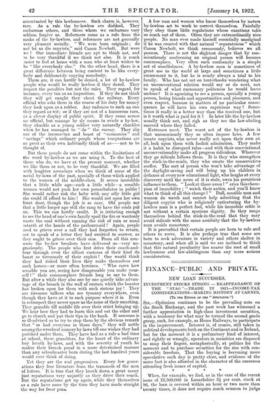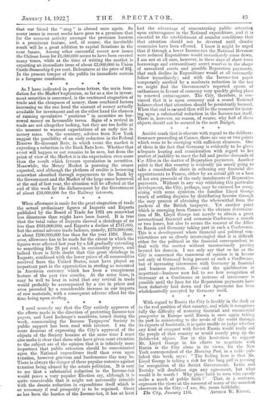FINANCE—PUBLIC AND PRIVATE.
■ •■■41111.■
NEW LOAN SUCCESSES.
INVESTMENT STOCKS STRONG — REAPPEARANCE Olr THE " STAG "—TRADE IN 1921—INCOME-TAX CONSIDERATIONS—MAKING HISTORY AT CANNES. [To rur ERITOR or THE " SPECTATOR.") Sni,—Optimism continues to be the prevailing note on the Stock Exchange, and the past week has witnessed a further appreciation in high-class investment securities, with a tendency for what may be termed the second grade group, such, for example, as Home Railways, to participate in the improvement. Interest is, of course, still taken in political developments both on the Continent and in Ireland; but for the moment it is a perfunctory kind of interest, and rightly or wrongly, operators in. securities are disposed to snap their fingers, metaphorically, at politics for the moment and to purchase securities for the rise with cony siderable freedom. That the buying is becoming more speculative each day is pretty clear, and evidence of the same fact is also afforded in the character of the successes attending fresh issues of capital.
When, for example, we find, as in the case of the recent issue of £2,500,000 in Lanarkshire. 5-1 per cent. stock at 96, the loan is covered within an hour or two more than twenty times, it does not require_ much, acumen to judge that our friend the " stag " is abroad once again. So many issues -in recent weeks have gone to a premium that for the moment activity amongst the premium hunters is a prominent feature, and, of course, the inevitable result will be a great addition to capital flotations in the near future. Among other successful recent new issues the Chilean Loan for £1,600,000 seems to have been covered many times, while at the time of writing the market is expecting an immediate issue of about £2,000,000 in Union -Castle Steamship 6 per cent. Debentures at the price of 93k. In the present temper of the public its immediate success is a foregone conclusion.
As I have indicated in previous letters, the main foun- dation for the Market's optimism, so far as a rise in invest- ment securities is concerned, is the continued stagnation of trade and the cheapness of money, these combined factors increasing on the one hand the amount of money actually available for investment and on the other hand the chances of running speculative " positions " in securities on bor- rowed money on favourable terms. Signs of a revival in -trade are not altogether lacking, but they are too feeble at the moment to warrant expectations of an early rise in money rates. On the contrary, advices from New York suggest the possibility of an early reduction in the Federal Reserve Re-discount Rate, in which event the market is expecting a reduction in the Bank Rate here. Whether that event, will happen or not remains to be seen, but from the point of view of the.Market it is the expectation even more than the result which favours speculation in securities. Meanwhile, the Money Market is pursuing the course expected, and although the plethora of credits is becoming somewhat absorbed through repayments to the Bank by the Government and the Market of the large sums borrowed at the end of last year, the situation will be affected at the end of this week by the disbursement by the Government of about £30,000,000 for the Railway interests.
* * * * When allowance is made for the great stagnation of trade the actual preliminary figures of Imports and Exports published by the Board of Trade for 1921 are somewhat less disastrous than might have been feared. It is true that the total value of Imports showed a shrinkage of no less than £846,000,000, and Exports a decline of £747,000, but the actual adverse trade balance, namely, £276,000,000, is about £100,000,000 less than for the year 1920. More- over, allowance has to be made for the extent to which the figures were affected last year by a fall gradually extending to something like 25 per cent. in commodity prices, and indeed there is little doubt that this great shrinkage in Imports, combined with the lower prices of all commodities received from the United States, must have played an important part in the appreciation in sterling as measured in American currency which has been a conspicuous feature of the past two months. At the same time, it may be well to bear in mind that any revival in trade would probably be accompanied by a rise in prices and even preceded by a considerable increase in our imports of raw materials, with a consequent adverse effect for the time being upon sterling. * * * I need scarcely say that the City entirely approves of the efforts made in the direction of protecting Income-tax payers, and Lord Inchcape's manifesto, issued during the week, commending the Income Taxpayers' Society to public support has been read with interest. I am the more desirous of expressing the City's approval of the objects of the Society because at the same time I must also make it clear that those who have given most attention to the subject are of the opinion that it is infinitely more important that public attention should be concentrated upon the National expenditure itself than even upon taxation, however grievous and burdensome this may be. There is always the danger of these popular outcries against taxation being abused by the astute politician. It is easy to see that a substantial reduction in the Income-tax would prove a very popular Election cry, although it is quite conceivable that it might not necessarily coincide with the drastic reduction in expenditure itself which is so necessary if real prosperity is to be regained. Great as has been the burden of the Income-tax, it has at least had the advantage of concentrating public attention upon extravagance in the National expenditure, and it is essential to the establishment of sounder conditions that that attention should not be diverted until drastic economies have been effected. I know it might be urged that if through a lower Income-tax the National Revenue were reduced Expenditure would immediately come down. I am not at all sure, however, in these days of short term borrowings and extraordinary secret reserves in the shape of unrealized assets and possible Reparation payments, that such decline in Expenditure would at all necessarily follow immediately; and with the Income-tax payer temporarily soothed by a moderate reduction in the tax we might find the Government's reported spasm of enthusiasm in favour of economy very quickly giving place to renewed extravagance. The City, therefore, is con- vinced that it is upon economy and a sound National balance-sheet-that attention should be persistently focused. When that end is secured then will be the moment for insist- ing upon a substantial reduction in the Income-tax itself. There is, however, no reason, of course, why both of these objects should not be secured in the next Budget.
Amidst much that is obscure with regard to the delibera- tions now proceeding at Cannes, there are one or two points which seem to be emerging with sufficient clearness. One of them is the fact that Germany is evidently to be given adequate hearing and consideration with regard to her protest of inability to meet the full and precise demands of tie Allies in the matter of Reparation payments. Another point is that this country is evidently (as usual) going to take a considerable share in softening any financial dis- appointments to France, either by an actual gift or a loan of her own proceeds of the early instalments of Reparation payments. Without in any way criticizing this particular development, the City, perhaps, may be excused for recog- nizing with some cynicism the familiar Lloyd George touch of settling disputes by distributing favours through the easy process of obtaining the wherewithal from the pockets of the British taxpayer. Yet another point which is emerging from Cannes is the obvious determina- tion of Mr. Lloyd George not merely to obtain a great international financial and economic Conference a month or two hence, but also to secure the consent of the Allies to Russia and Germany taking part in such a Conference. This is a development where financial and political con- siderations are so closely intermingled that it is difficult either for the political or the financial correspondent to deal with the matter without unconsciously passing beyond his domain. I can only say that so far as the City is concerned the consensus of opinion is in favour not only of Germany being present at such a Conference, but of increasing intercourse with Germany in financial and business matters. But—and the qualification is important—business men fail to see how recognition of Germany at a Conference or increase of intercourse is possible until the lines for the Reparation payments have been definitely laid down and the Agreement has been wholeheartedly accepted by Germany itself.
* * * With regard to Russia the City is frankly in the dark as to the real position of that country, and while it recognizes fully the difficulty of restoring financial and commercial prosperity in Europe until Russia is once again taking its part in ministering to the needs of the world through its exports of foodstuffs, it is quite unable to judge whether any kind of compact with Soviet Russia would really aid the people of that country or would merely prop up the Bolshevist regime. Nor in this hesitation to support Mr. Lloyd George in his efforts to negotiate with Russia is the City alone in its views, for the New York correspondent of the Morning Post, in a cable pub- lished this week, says: " The feeling here is that Mr. Lloyd George is taking a risk for the long pull in pressing for recognition of the Soviet Government. Lenin and Trotsky will doubtless sign any agreement, but what would it be worth ? Why place faith in men who openly make a mock of public faith ?" That, in a sentence, expresses the views at the moment of many of the soundest observers in the City.—I am, Sir, yours faithfully,



































 Previous page
Previous page